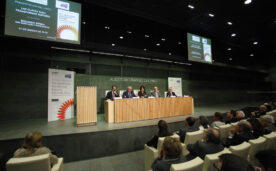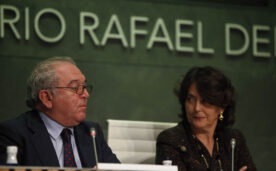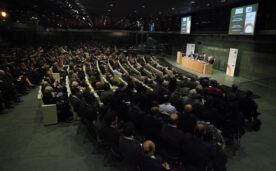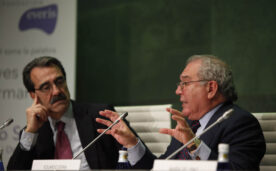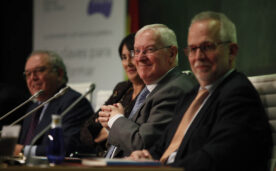On 31 January 2012, the Rafael del Pino Foundation hosted the presentation of the book "Las claves para transformar España", published by Ediciones Destino. The event was attended by María del Pino, President of the Rafael del Pino Foundation; Ramón Perelló, publisher of Ediciones Destino; Eduardo Serra, co-author of the book -together with Marc Alba and David García- and President of the everis Foundation; Emilio Ontiveros, President of AFI and Professor of Business Economics at the Autonomous University of Madrid; and Víctor García de la Concha, recently appointed Director of the Cervantes Institute.
Eduardo Serra stated that: "Civil society has the tools to bring about change. And if it does not have them, it will have to find them. It would not be a bad thing if it were given the necessary means. For me, the most important is the recovery of trust. It is a process that has been underway for years now, whereby we have realised that the recent past has taught us what we are capable of doing; we have to use that lesson as a springboard to take the next leap forward. Spain is now in no man's land: we are not an emerging country, but we have not yet completed the transition to a leading economy and we have to get out of this impasse. Undoubtedly, civil society must be the driving force, the active subject of the transformation and not the object of it. This is, in a way, the most urgent reform: to be aware that we are ultimately and truly responsible and that politicians, among others, are our representatives. But those ultimately responsible, those who have to carry out the changes, are us".
Eduardo Serra considered the measures being taken by the government in economic matters to be appropriate: "I believe that the measures that have been announced are on the right track and what - in my opinion - needs to be done is being done. The problem lies in the "how" and the "when", in the policies and the timing. Some would like, perhaps, more speed [in implementing reforms]; others, more prudence... I believe that therein lies what is called political genius: in calculating the opportunity to do things with the best - and greatest - possible effect [...]. The book proposes many actions to be taken, but I think the key is that we work for the long term and with as much consensus as possible. Together we will do much more than separately if we look at the long term".
